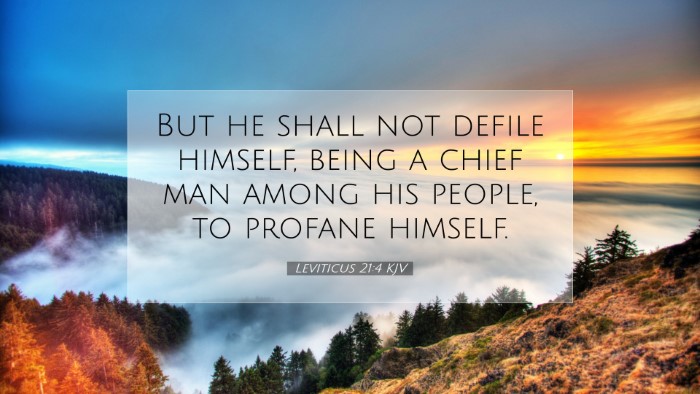Commentary on Leviticus 21:4
Verse Context: Leviticus 21:4 states, "Neither shall he defile himself, being a chief man among his people, to profane himself." This verse falls within a larger section that outlines the laws pertaining to the holiness required of the priests in Israel.
Understanding the Holiness Code
This section of Leviticus is often referred to as the "Holiness Code," which emphasizes the distinctive role of the Aaronic priesthood. The responsibilities and privileges of the priests necessitate an adherence to a higher standard of holiness and conduct.
Matthew Henry's Insights
Matthew Henry underscores the serious nature of the priestly responsibilities. He notes that the priest is not only to uphold the duties of worship but also to reflect the holiness of God in his life. This is vital because his actions influence the community's spiritual relationship with God.
Albert Barnes' Perspective
Albert Barnes elaborates on the term "defile" in this context. He suggests that it extends beyond mere physical contamination; it implicates the spiritual integrity of the priest as well. A chief man, or a high-ranking priest, is called to maintain an exemplary life, lest he lead others astray. His actions bear significant weight, being closely watched by the people he serves.
Adam Clarke's Analysis
Adam Clarke offers a cultural reflection on the verse, explaining how the customs of ancient Israel defined the conduct expected from leaders. He emphasizes that leaders among the people were to avoid any actions that could lead to their defilement as such actions carried not only personal consequences but also communal repercussions.
Historical Context
In ancient Israel, the priest's role was steeped in ritual purity and moral integrity. The regulations mentioned in Leviticus served multiple purposes:
- Significance of Ritual: The priests were mediators between God and the people, thus requiring a level of holiness that was reflective of their unique role.
- Impact on Community: A priest's behavior and spirituality had profound effects on the entire community, reinforcing the importance of a personal commitment to God’s laws.
Application for Today's Leaders
This principle of holiness applied to leaders is timeless and can serve as a guiding principle for pastors and church leaders today. The charge to avoid defilement mirrors the New Testament call for church leaders to be above reproach (1 Timothy 3:2) and to bear the fruit of the Spirit.
Practical Applications
The following applications can be derived from Leviticus 21:4 and the commentaries:
- Personal Holiness: Church leaders must prioritize their personal spiritual growth, recognizing that their lives serve as examples to others.
- Awareness of Influence: Understanding that their actions have far-reaching effects on the congregation and community can inspire leaders to act with integrity.
- Guarding Against Defilement: Today’s leaders should be vigilant against influences—cultural or behavioral—that lead to spiritual compromise.
Theological Implications
Theologically, this verse reflects a profound truth about God's expectations for those who serve in ministry. They embody and represent God’s holiness; therefore, their moral and spiritual conduct is paramount. Recognizing this, pastors and theologians can delve into deeper discussions about the nature of holiness and its manifestation in leadership.
Conclusion
Leviticus 21:4 serves as a critical reminder of the sacred responsibilities entrusted to those in leadership roles within faith communities. The insights from public domain commentaries emphasize the need for holiness in conduct, awareness of one's influence, and the weight of responsibility carried by leaders. As such, this verse continues to resonate, encouraging a deeper commitment to holiness and integrity in ministry.


